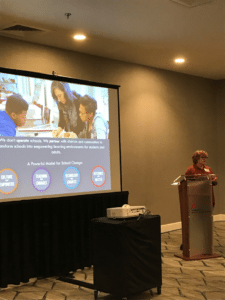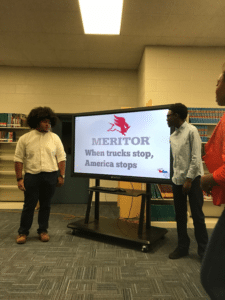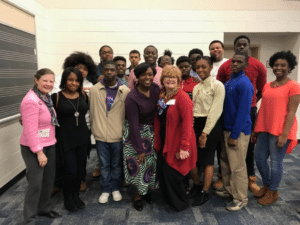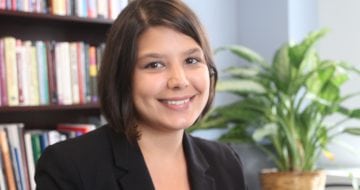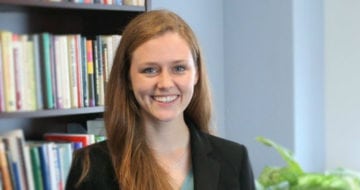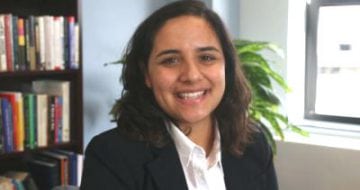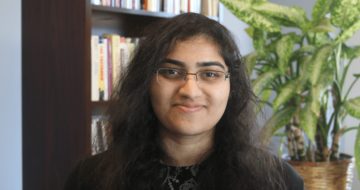When you’re trying to transform a school learning environment, effective partnerships matter. This was a recurring theme heard during an AYPF study tour to South Carolina, where we visited two high-poverty, rural schools on the journey to improving outcomes for their students. Transformation of these schools, located in what is historically known as the ‘Corridor of Shame,’ has meant a true embracing of the ‘Corridor of Innovation’ – their new moniker. Many partners have supported and continue to support this transformation.
You might be wondering, who are these partners? They are a combination of outsiders and insiders from the worlds of education and business, all contributing their expertise to support student success. Educators share innovative ways of creating learning environments that foster student creativity and exploration – traits highly valued by the business community and postsecondary institutions.
One critical partner is The Riley Institute, based at Furman University. In 2011 they partnered with KnowledgeWorks and two schools, Scott’s Branch and Cougar New Tech, to apply for an Investing in Innovation (i3) grant entitled “Creating a Corridor of Innovation.” Once they received the grant in 2011, they set about working with the New Tech Network (NTN), the school design partner, and the two schools.
Over the years, The Riley Institute has modeled for lawmakers strategies that work to improve educational outcomes, and the two schools are seen as ideal models for legislators and other school districts. This is critical work as the state legislature has been reluctant to increase funding for schools. Since school districts are dependent primarily on local property taxes and often have a depressed economic base, this investment helped the Institute demonstrate how important it is for the legislature to increase funding to poor, rural schools in the state.
The NTN is another important partner supporting the transformation of these schools. As Lydia Dobyns, President of the NTN shared, they are a school design partner invited in by the district superintendent to bring in the model, which is based on four pillars:
- A culture that empowers
- Teaching that engages
- Technology that enables
- Outcomes that matter
The NTN’s approach is to partner with organizations that have roots in the community. As Dr. Kristin Cuilla, Senior Director of Partnerships and Communication at the NTN shared, instead of parachuting teachers in, the NTN works actively with people who have roots in the community, paving the way for innovative practices to be sustained over time.
The work of transforming these schools involves incorporating project-based learning, a one-to-one technology ratio, and inculcating a culture of trust, respect, and responsibility across the campuses. Part of the project-based learning involves local industry partners such as Boeing and Meritor, who provide students with work-based learning experiences. However, the NTN acknowledges that one size does not fit all, as the two schools are approaching the Corridor of Innovation project differently: Cougar New Tech is a school within Colleton County High School (a large comprehensive high school) and Scott’s Branch is a whole-school converted to the New Tech model.
Support for this innovative work is evident from the SC Department of Education, another very necessary partner. On the trip, we heard from Dr. Latoya Dixon, Director of the Office of School Transformation at the Department who said the Department is considering moving beyond support and coaching at the school building to focusing on a systems approach. This is critical as, along the I-95 highway corridor, there are districts where the majority of schools are in priority status. Latoya also noted that statewide support has been essential in reaching many underserved schools, as many schools could not otherwise support transformative work.
At the same time, Department of Education staff are also working to contextualize the problems schools are facing and provide solutions that work in local contexts. Underpinning the vision the state has for student learning is the Profile of a South Carolina Graduate, shared with us by Lauren McCauley, Personalized Learning Education Associate at the Department. This profile combines world-class knowledge and skills and life and career characteristics, such as self-direction, global perspective, perseverance, work ethic, and interpersonal skills. Lauren noted that SC has a number of schools and a handful of districts starting to use a personalized approach for instruction. Over the past year, they have led conversations defining what is meant by personalized learning, so that they put in place a solid framework upon which to base the supports offered to schools. They are also scanning policies and regulations to find opportunities to remove barriers to innovative education. Schools may request flexibility or waivers, and they are starting to examine how to make these innovative practices the norm, rather than relying on waivers.
In addition to state-level support, there is also support provided by a business-led nonprofit, TransformSC. Dr. Peggy Torrey, Director of TranformSC, explained that the organization was formed by business and education leaders with the goal of incubating innovation. “Whatever schools want to innovate, we want them to show us after a three-year period how innovation will affect every student, every day, in every classroom.”
As schools undertake this transformation, the business community is going to bat for them, working with legislators and the State Board of Education to remove barriers and fostering grass-roots efforts at the school and community levels. The SC House Education Committee has just appointed an ad hoc committee on competency-based education (CBE) – and the business community spent 90 minutes talking to that ad hoc committee about the value of CBE.
TransformSC also hosts institutes around innovative practices, such as blended learning and problem-based learning, and they provide a support network for school principals. One of the concrete actions accomplished by TransformSC involves the 180-day rule whereby students have to be in their seats for that amount of time. The organization has helped get waivers for many schools from that rule. Despite these successes, Peggy underscored that this work is not easy. One struggle revolves around sustaining this work in the schools, as so much depends on school leadership. As she noted, “when leadership changes, innovation goes with them.”
Working together, these partners have contributed to a rise in achievement at Scott’s Branch High School and Cougar New Tech. The students and teachers we met were excited about learning, eager to share their practices and insights, and hopeful about continued progress. Partnerships have indeed paid off.
Loretta Goodwin is a Senior Director at the American Youth Policy Forum.



